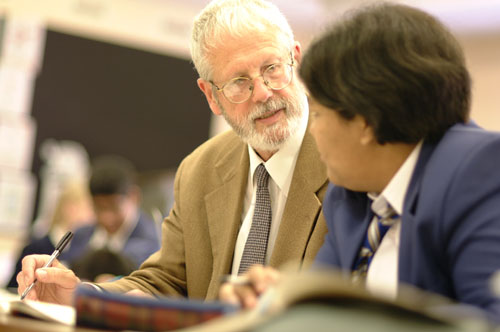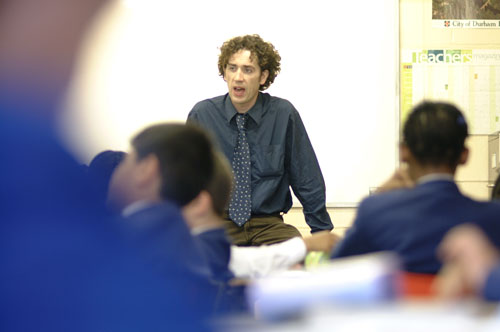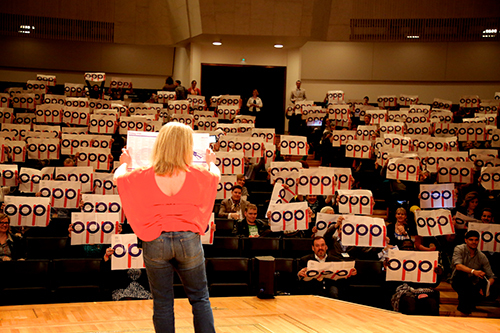
“It is time for the race to the bottom to end. We believe it is time to tackle grade inflation and dumbing down.” — Michael Gove
In the fall of 2012, the British Education Secretary, Michael Gove, outlined proposals for new qualifications in core academic subjects called English Baccalaureate Certificates. Κ. Gove stated that these new reforms would prepare British students for the 21st century and allow them to compete with the best performing education systems around the world.
Are the new performance measures proposed by Michael Gove a solution to “teaching to a test,” improving standards and the overall quality of learning for all students in the UK education system? I asked Michael Young, Emeritus Professor of Education with the School of Lifelong Education & International Development at the Institute of Education, University of London, να μοιράζονται τις απόψεις του.
Σε 2004, Michael Young was commissioned to write a report on the implications of National Qualifications Frameworks for developing countries (ILO 2005). He has been an adviser to countries in Europe, Africa and Asia on their policies on qualifications. His book, Φέρνοντας Γνώση Back In (2010), won second prize as UK Education Book of the Year.

What do you believe are the best and weakest arguments for having the English Baccalaureate Certificates replace the GCSE’s? What would be your best arguments for keeping the GCSE exams?
The main reason why none of the main political parties will risk supporting the widely held view that GCSEs (ο 16+ examination) should be abolished is that they are used as the basis of performance tables which enable government to assert a degree of control over schools at a time when they are weakening the existing controls of local government over schools.
GCSEs are a relic of two earlier initiatives. GCE O levels were established in 1951 to cater for at most 20-30 percent of each cohort (each class of students). ΕΚΕΙΝΗ ΤΗΝ ΠΕΡΙΟΔΟ, the majority of pupils left school at 15 (with no certificates) for unskilled factory and office work. Η αγορά εργασίας για τους νέους εξαφανίστηκε στη δεκαετία του 1970, έτσι ώστε αυτά τα παιδιά έμεναν στο σχολείο χωρίς πιστοποιητικό για να επιδιώξει. Ένα νέο πιστοποιητικό, το πιστοποιητικό για τη Δευτεροβάθμια Εκπαίδευση (ΧΑΚ), δημιουργήθηκε για τις χαμηλές επιδόσεις. GCE και Χρηματιστηρίου στη συνέχεια συγχωνεύθηκαν στη δεκαετία του 1980 για να δημιουργήσει τις υπάρχουσες GCSE του, με πέντε βαθμούς (Ένας – Και); Ένας, Β, C είναι ισοδύναμες με τις παλιές επίπεδα O και D, Και, ΣΤ, και G αντικατάσταση του ΧΑΚ. The latter became largely worthless for either employment or progression to higher levels and the focus of schools was on grade C or above.
Την ίδια στιγμή, assessment for exams was changed from being norm referenced to criterion referenced, with no limits on the numbers being awarded any grade. The proportion of A – C’s increased every year and this led to a demand for an A* grade to differentiate the A’s. The government feared that if they scrapped GCSE’s (most other European countries do not have a 16+ examination), England would drop in the international performance tables (π.χ.. PISA), and that this might cost them votes. Επίσης, there is no tradition for trusting teachers to maintain standards without tests and tables. The problem is that students are increasingly ‘trained for the tests’ και, according to employers and university teachers, know less and less.
The English Baccalaureate (the E Bacc) is a performance measure not an examination. Until it was introduced, performance tables were based on 5 θέματα, but only three were compulsory (Αγγλικά, maths and general science). The E Bacc merely extends the number of compulsory subjects to include two sciences, a foreign language and a humanities subject. This has had two consequences: Πρώτα, schools are dropping many non E Bacc subjects with much opposition from sports and arts communities. Δεύτερος, schools with, λένε 30 percent of pupils achieving 5 A-Cs on the GCSE subjects, only achieved 5 τοις εκατό (or less) on the E Bacc, primarily because they had dropped foreign language when it stopped being compulsory.
The English Baccalaureate has the merits of strengthening the general academic education of lower achieving students and removing useless, mostly quasi-vocational subjects. The government claims that the E Bacc subjects take up 70 percent of the school timetable, leaving adequate time for arts and sports. Ωστόσο,, the performance tables, which rank schools with implications for resources and student intakes, shape all school decisions, so few of the educational benefits of the E Bacc will be realized as long as they are in place.
The English Baccalaureate is an ill thought out, off the cuff scheme. A better approach would be something along the French Baccalaureate lines, δηλαδή. a three pathway (general/technological/vocational) Baccalaureate with 20+ percent of the curriculum in common, which students can take at different ages and for which there is no external examination at 16.

What about taking an approach similar to the International Baccalaureate that measures student’s performance against global peers?
I am a great admirer of the IB, but as an 18+ exam it cannot include more than about 30-40 percent of each cohort without a more applied pathway. I would have a single external examination taken at different ages and abolish performance tables. The key issue is to develop a system in which assessment does not drive curriculum. I am not against the English Baccalaureate in principle. What worries me is its inevitable link to performance tables.
Students learn best when they are being taught to learn as opposed to being taught just to pass a test. Agree?
I agree as long as ‘teaching to learn’ is through specialist subjects. You can only teach or learn something. Teaching to learn and learning to learn are the products of good subject teaching.
As I said earlier, we have standardized tests for social control reasons. Ωστόσο,, if you don’t have standardized tests, the social control issues remain. Finland is a good example. They always score high on PISA rankings but they have no external tests and no inspections. How do they do it?
Πρώτα, Finns put a high value on education for all – originally out of fear of ‘big brother’ – the Soviet Union.
Δεύτερος, teaching is a high status profession in Finland. Education faculties in Finland have the highest number of applications for each place.
Τρίτος, the richest, most powerful, and most successful parents use the state schools, δηλαδή. λιγότερο από 1 percent of children go to private schools. They have a stake in the quality of schools. In England, 7 percent of schools are private (fee paying). The political pressure is not to improve state schools but to control them. The rich have no stake in the state schools!
Τέταρτος, μια κοινωνία θα πρέπει να ελέγχουν τα σχολεία, είτε με συναίνεση αποτίμηση της εκπαίδευσης για όλους, or through tests and inspections. If you abolish the latter without establishing the former, θα έχει να αντιμετωπίσει το χάος.

Ποιο ρόλο θα πρέπει η βρετανική κυβέρνηση να διαδραματίσει στον τομέα της εκπαίδευσης?
Μέχρι τη δεκαετία του 1980 και η Μάργκαρετ Θάτσερ, δημόσια εκπαίδευση αντιμετωπίζεται ως ένα σχετικά αναποτελεσματικό σύστημα της τρόικας της κεντρικής κυβέρνησης, αυτοδιοίκηση, και τα συνδικάτα των εκπαιδευτικών. Θάτσερ έσπασε όλα αυτά ως σκέφτηκε την τοπική αυτοδιοίκηση και τα συνδικάτα (οι πάροχοι) had too much power, and parents and employers (consumers) not enough. So she used government to replace ‘provider control’ by a ‘market.’
Why not allow local governments to determine their cities’ or towns’ own educational standards?
It is the rational but not politically realistic option. It’s a view largely shared by the Labour party since Blair.

Surveys indicate that parents want to see the arts included in the new Baccalaureate. What are your best arguments for keeping the arts in this new assessment?
As I said before with regard to other subjects, if they keep the performance tables and bring arts into the E Bacc, it will destroy the arts, as schools will be under pressure to teach to the test! A better but unlikely solution would be to abolish the performance tables and broaden the E Bacc.
Since not every child will pass these new exams, what else can be done to prepare children for the real world and make them more competitive in the job market?
In the last decade, lower achieving students have been encouraged to obtain certificates which have no value outside the tables themselves, as they provide no progress to higher level study and employers do not rate them for jobs. The fact that the students get certificates masks the reality that they are not learning anything. At least the E Bacc’s base curriculum will highlight rather than mask low achievement. The problem is that many schools lack specialist subject teachers in the E Bacc subjects, so unless something is done about teacher supply, nothing will improve.

Photos courtesy of the Institute of Education, University of London.
Στο παγκόσμιο Αναζήτηση για Εκπαίδευση, μαζί μου και παγκοσμίως γνωστή ηγέτες σκέψης συμπεριλαμβανομένου του Sir Michael Κομμωτήριο (Ηνωμένο Βασίλειο), Ο Δρ. Michael Block (ΗΠΑ), Ο Δρ. Leon Botstein (ΗΠΑ), Καθηγητής Clay Christensen (ΗΠΑ), Ο Δρ. Linda Ντάρλινγκ-Hammond (ΗΠΑ), Ο Δρ. Madhav Chavan (Ινδία), Ο καθηγητής Michael Fullan (Καναδάς), Ο καθηγητής Howard Gardner (ΗΠΑ), Ο καθηγητής Andy Hargreaves (ΗΠΑ), Ο καθηγητής Yvonne Hellman (Η Ολλανδία), Ο καθηγητής Kristin Helstad (Νορβηγία), Jean Hendrickson (ΗΠΑ), Καθηγητής Rose Hipkins (Νέα Ζηλανδία), Καθηγητής Cornelia Hoogland (Καναδάς), Αξιότιμο Jeff Johnson (Καναδάς), Η κ. Chantal Kaufmann (Βέλγιο), Ο Δρ. Eija Kauppinen (Φινλανδία), Υφυπουργός Tapio Kosunen (Φινλανδία), Ο καθηγητής Dominique Λαφοντέν (Βέλγιο), Ο καθηγητής Hugh Lauder (Ηνωμένο Βασίλειο), Καθηγητής Ben Levin (Καναδάς), Lord Ken Macdonald (Ηνωμένο Βασίλειο), Καθηγητής Barry McGaw (Αυστραλία), Shiv Nadar (Ινδία), Καθηγητής R. Natarajan (Ινδία), Ο Δρ. PAK NG (Σιγκαπούρη), Ο Δρ. Denise Πάπα (ΗΠΑ), Sridhar Rajagopalan (Ινδία), Ο Δρ. Diane Ravitch (ΗΠΑ), Richard Wilson Riley (ΗΠΑ), Sir Ken Robinson (Ηνωμένο Βασίλειο), Καθηγητής Pasi Sahlberg (Φινλανδία), Andreas Schleicher (PISA, ΟΟΣΑ), Ο Δρ. Anthony Seldon (Ηνωμένο Βασίλειο), Ο Δρ. David Shaffer (ΗΠΑ), Ο Δρ. Kirsten Μοναδική Are (Νορβηγία), Στήβεν Spahn (ΗΠΑ), Yves Theze (Lycee Francais Η.Π.Α.), Ο καθηγητής Charles Ungerleider (Καναδάς), Ο καθηγητής Tony Wagner (ΗΠΑ), Sir David Watson (Ηνωμένο Βασίλειο), Καθηγητής Dylan Γουίλιαμ (Ηνωμένο Βασίλειο), Ο Δρ. Mark Wormald (Ηνωμένο Βασίλειο), Ο καθηγητής Theo Wubbels (Η Ολλανδία), Ο καθηγητής Michael Young (Ηνωμένο Βασίλειο), και ο καθηγητής Minxuan Zhang (Κίνα) καθώς εξερευνούν τα μεγάλα ζητήματα της εκπαίδευσης εικόνα που όλα τα έθνη αντιμετωπίζουν σήμερα. Η Παγκόσμια αναζήτηση για την Εκπαίδευση της Κοινότητας Σελίδα
C. M. Rubin είναι ο συγγραφέας των δύο πολυδιαβασμένα online σειρά για την οποία έλαβε ένα 2011 Βραβείο Upton Sinclair, “Η Σφαιρική Αναζήτηση για Εκπαίδευση” και “Πώς θα μας Διαβάστε?” Είναι επίσης ο συγγραφέας του μπεστ σέλερ τρία βιβλία, Συμπεριλαμβανομένων Η Ρεάλ Αλίκη στη Χώρα των Θαυμάτων.






Πρόσφατα σχόλια